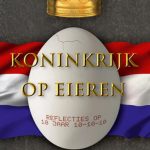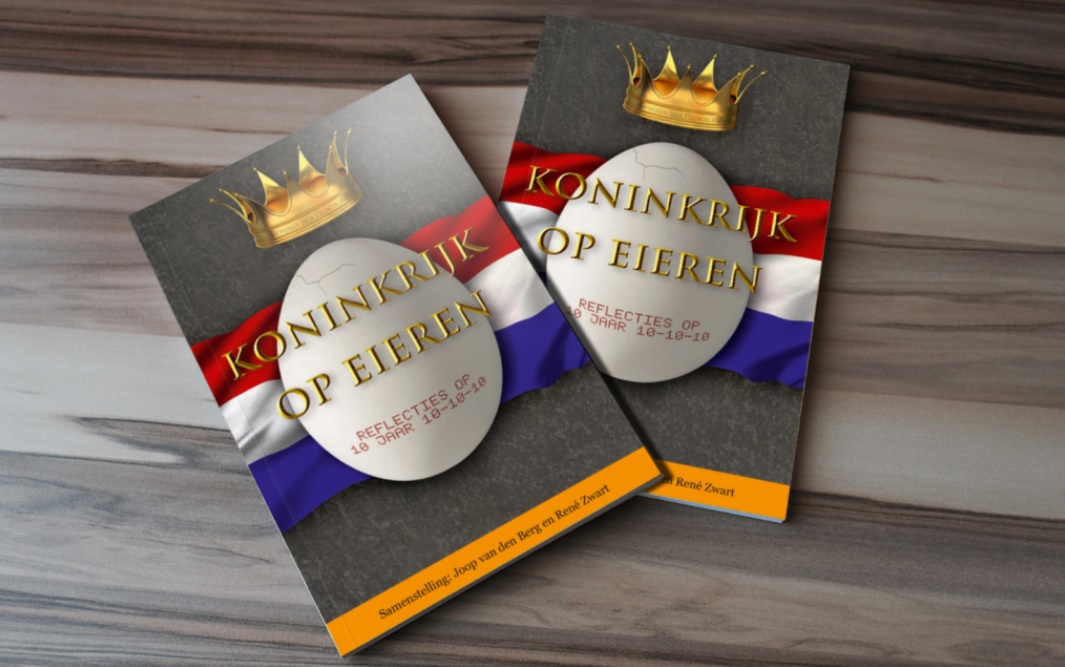Koninkrijk op Eieren: “This Kingdom is a failure”
PHILIPSBURG – “In The Hague you had to use a searchlight to find the few people who were really interested in the islands. You cannot be successful with that dossier,” former Minister of Administrative Innovation and Kingdom Relations Alexander Pechtold writes in his contribution to Koninkrijk op Eieren, a book with observations by a colorful crowd of fifty scientists, politicians and other stakeholders about the dismantling of the Netherlands Antilles and the formation of the autonomous countries Curacao and St. Maarten.
 Retired professor Joop van den Berg and former journalist René Zwart compiled the book. Its title refers to the Dutch expression op eieren lopen – acting extremely carefully. The cracked egg on the book cover tells the story of the strained relationship in the Kingdom between the Netherlands and its former colonies in the Caribbean.
Retired professor Joop van den Berg and former journalist René Zwart compiled the book. Its title refers to the Dutch expression op eieren lopen – acting extremely carefully. The cracked egg on the book cover tells the story of the strained relationship in the Kingdom between the Netherlands and its former colonies in the Caribbean.
Pechtold illustrates the cumbersome relationship with St. Maarten during his tenure (March 31, 2005 – July 3 2006) with an anecdote about Theo Heyliger, at the time an icon in the ruling Democratic Party. “Making an appointment with Heyliger was impossible. He was always off-island,” Pechtold remembers. “One day I just walked into the government administration building and I just saw how he fled into a bathroom. I went to stand in front of the door and shouted” Mr. Heyliger, I am only going to leave from here after I have spoken to you.”
Among the many contributors to the book are Sarah Wescot-Williams, William Marlin, Ronald van Raak, André Bosman, former prime Minister Jan Peter Balkenende, Mike Eman, Will Johnson, Nico Schoof (chairman of the Progress Committee), Xavier Blackman and Jorien Wuite.
Wescot-Williams notes in her chapter that St. Maarten has been short-changed with the debt relief, while Marlin focuses on colonialism: “I suspect that The Hague has a larger political plan to not let go of the colonies. Every time they make new demands that make it impossible for us to govern. If it continues like this there is only one way out for St. Maarten: independence.”
Hardly anyone seems to agree with Marlin. Pechtold writes: “Are the Caribbean islands not using the Netherlands as a lightning rod for their own problems?”
Parliamentarians Ronald van Raak revisits familiar arguments as he speaks of the “devilish trinity of Antillean politics.” He claims to possess “messages that show how before 10-10-10 the underworld took measures to grab power in the autonomous countries Curacao and St. Maarten.” The trinity Van Raak refers to consists of “the gambling industry, consultants and local politicians that are prepared to take bribes.”
Van Raak is pessimistic about the present and the future. “The relationship with the Netherlands is bad. It is really bad that ten years ago the Netherlands made these autonomous countries to let them fall into the hands of criminals. This kingdom is a failure and it is now up to the population to decide about the way forward.”
Nico Schoof, since 2015 chairman of the Progress Committee that monitors the plans of approach for the police force and the prison in St. Maarten, writes that things are not going well at all with the prison. “St. Maarten is responsible but it is unable to improve the detention situation.”
Schoof pinpoints the underlying causes: “Alternating political will and incompetence and unwillingness of the civil service.” He notes that nothing has come of the new plan of approach or of the list of agreements. St. Maarten does not ask for help and the Netherlands is not providing it. The relationship is based on distrust, arrogance, disinterest and suspicion. A large part of the political elite on St. Maarten has shown to attach more importance to their own position than to the interest of building up the country.”
A quote from VVD-parliamentarian André Bosman illustrates Schoof’s point, as he repeats a statement by former Minister of Justice Cornelius de Weever: “If the problem becomes big enough it automatically becomes a problem of the Kingdom.”
Gert Oostindie, director of the Royal Institute of Southeast Asian and Caribbean Studies at Leiden University, dismisses any notion of neo-colonialism. “Colonialism was driven by economic and strategic self-interest; the administrative return of the Netherlands is born out of necessity.”
Oostindie writes that administrative incompetence on the islands is a central problem. “Outside of the island nobody thought it would be a good idea to turn St. Maarten into an autonomous country. I am becoming increasingly impatient with the kind of politicians on the islands who in defending the autonomy primarily seem to think about their own position, or who reject Dutch involvement out of false or misplaced pride.”
Professor of Constitutional Law at Groningen University Gerard Hoogers is clear in his opinion: “Especially due to its endemic political instability, St. Maarten has never managed to function as a fully autonomous country.” The troubled relationship with the Netherlands does not help either: “There are feelings of frustration, anger and irritation about missed opportunities and paternalistic meddling. The administrative relationships are lousier than ever and the state secretary has openly said that the islands cannot carry their autonomy.”


























